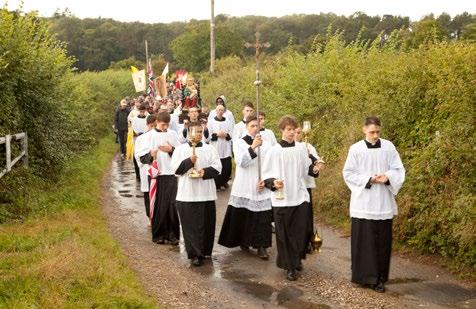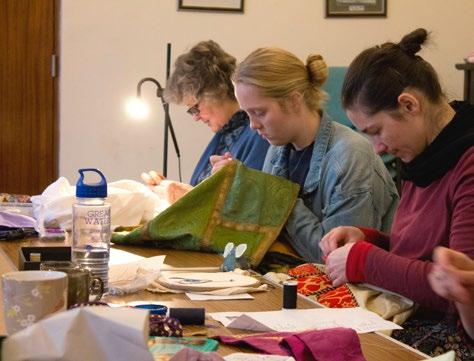
7 minute read
Why Join the Latin Mass Society?
If you are not a member of the Latin Mass Society, we would like to appeal to you to join. If you are a member, we would be grateful if you could encourage others to join. As we prepare for our 60th anniversary next year, we want to ensure that the society lives to fight on for the traditional Mass for the next 60 years –and beyond.
Why should anyone join the Latin Mass Society?
The society exists to support the continued celebration of the traditional Mass. If you are reading these words, you probably know what that is, and probably think it has value. If we have cause to regret the disappearance of a historic minority language, whose great literature will never again inspire a native speaker, or the extinction of an animal species, which will never again be seen in its natural habitat, we should do what we can to prevent the loss of a great cultural artefact: one that is simultaneously recognised as a great work of art, and as a sublime expression of Catholic worship.
Is the Traditional Mass in danger? And is the Latin Mass Society’s work critical to its survival?
At the time of writing, we have had three documents from the Holy See enacting more and more severe restrictions on the traditional Mass since 2021, and another could arrive at any moment: perhaps even by the time you read this.
We have confidence that the Mass will ultimately survive this challenge, as it has survived so many challenges before. This confidence is based, however, on the fact that this sublime Mass has many dedicated supporters, both priests and lay people, and that these supporters are organised and coordinated through all sorts of formal and informal networks, of which the Latin Mass Society, with our sister organisations around the world, is the most important for lay people.
LMS Walking Pilgrimage to Walsingham
What does the Society do that is so important?
For sixty years ‘Latin Mass Society’ and ‘Una Voce’ groups all over the world have done three things indispensable to saving the traditional Mass.
First, we have provided moral and practical support to priests who wish to say the traditional Mass. From printing booklets of the Ordinary Prayers of Mass to diffusing expert canon law advice, from finding singers and servers to lending sets of vestments, we help to make good things happen. Some are labelled ‘Latin Mass Society events’, others as organised principally by a parish, priestly institute, or a group of lay people: what is important is that they take place, with the greatest possible solemnity and dignity.
Second, we have represented the needs, desires and opinions of our members and support to the press, to social media, and above all to our superiors: to our bishops and to the Holy See. If the traditional Mass is to be said regularly and publicly, it must be justified in pastoral terms, and in this the voice of the laity is crucial. If that voice is not to be ignored, it needs to find an echo in the media.
Third, we have published research, statistics, canon law opinions, and other materials to support the case for the traditional Mass. Last year I published The Latin Mass and the Intellectuals: Petitions to Save the ancient Mass from 1966 to 2007. This was made possible by the archives and networks of the Latin Mass Society, and in turn underpins not only the historic case for the ancient Mass, but also new efforts such as a new petition organised by Sir James MacMillan, a Latin Mass Society Patron. Why not leave it to the clergy?
The Latin Mass Society is unwavering in its support for priests who celebrate the traditional Mass. We give financial support to seminarians in the traditional Priestly Institutes; we make all kinds of resources available to priests; and our network of Local Representatives are always on hand to help. Most of this help is invisible, but it is invaluable.
Some things are best done by a national organisation. Our Walking Pilgrimage to Walsingham, or the Guild of St Clare, our network of people making and mending vestments, this magazine, are all things that could not be organised by a single parish, or by the United Kingdom members of one Priestly Institute.
Other things can only be done by lay Catholics. Many priests and indeed bishops were grieved at the documents from Rome restricting the Latin Mass, but they were not quoted by name in news reports on the subject. It is simply impossible for them. As Chairman of the Latin Mass Society, by contrast, I am happy to speak on the record, and to write under my own name, and I have been quoted all over the Catholic press, in the Daily Telegraph, by the Associated Press, and by the BBC, in the United Kingdom and beyond it.
Why not leave it to the online commentators?
There are ‘Catholic commentators’ in the media who do nothing else but comment on the Latin Mass and associated matters. Why do we need a lay organisation to provide another voice?
There are some highly professional Catholic journalists who are good friends of the Traditional movement. They are not campaigners, however: their work is constrained by the needs and policies of their employers. Other commentators have the opposite problem: not having an employer, they constantly have to keep their fans interested. Again and again, we have seen this lead to exaggerations, hysteria, and even problems for the commentator himself.
The traditional movement needs organisations where practical wisdom can be nurtured and passed on, and where constant involvement with priests and lay volunteers, organising ordinary devotional events, training, and research, gives those involved an insight into both challenges and opportunities. The Latin Mass Society stands for honesty and stability; for speaking frankly and also respectfully; in respecting confidences, and basing our thinking on real experience; in giving our supporters honest warnings of difficulties to come, but not milking emotion from every headline.
The society can keep in touch with friendly public figures, with journalists, with the hierarchy, and even with celebrity commentators, but we are represented, not by celebrities, but by our unpaid trustees.
What has the Latin Mass Society achieved?
It is impossible to quantify the achievements of the Latin Mass Society. The Masses that have been celebrated thanks to the assistance of our volunteers. The people who have been drawn into helping thanks to our network. The reassurance given to our supporters that they are not alone, in their feelings and aspirations. And the influence of our patient, respectful, but persistent appeals to priests, bishops, and the Holy See.
The Latin Mass Society and similar organisations around the world, have made a positive contribution precisely because we are involved both in the theory and the practice of the traditional movement: the letters to bishops, the media engagement, the organisation of pilgrimages, the finding of the crucial altar server or the missing cope for benediction. We could not have made this contribution without our members.
Why are members important?
The membership of the Latin Mass Society is our most crucial resource. Membership fees are an important and stable source of income, but our membership is even more valuable for other reasons.
Our members form a dense network around the country, and the spirit of the Latin Mass Society— unwavering commitment to the traditional Mass combined with respect for our superiors—is a critical component of every traditional congregation, and of many Catholic organisations.
Our members are the pool from which we draw our volunteers.
Our members give the Society standing. The Latin Mass Society represents its members, above all, and can claim to speak to them.
The same tendency towards individualism and away from group identity and commitment that have contributed to lapsations from the faith since the 1970s have weakened all kinds of membership organisations. As traditional Catholics we know we must stand against this process, and for our own sakes as well as for others’, support the inevitably imperfect communities and associations that give us meaningful connections with our fellow Catholics.
So, please: if you are not a member, join us now. If you are a member, give this magazine to someone who needs encouragement to join.











